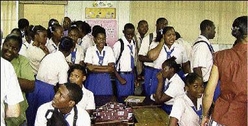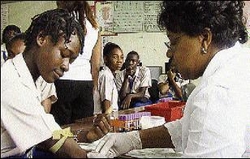
Students of Porus High School in Manchester wait anxiously in their sick bay to be tested for the sickle-cell trait recently. - photos by Mark Beckford
Nervous chatter and laughter filled the room along with an occasional loud cry from the girls - all punctuating the anticipation students felt.
Fifth-formers at the Porus High School sick bay provided those sounds as they waited to be screened for the sickle-cell trait.
The teenagers were participating in the Sickle Cell Trust's Manchester project.
The project seeks to detect the genotype for the trait in high-school children and to determine whether this information can reduce babies born with sickle-cell disease.
Sickle-cell disease is a genetic condition affecting one in every 150 births in Jamaica. The disease comes as a result of inheriting abnormal haemoglobin genes from both parents.
Sickle-cell disease causes increased risk of infections, leg ulcers, bone damage, early gallstones, kidney and eye damage.
The five-year project is in its third year.
Professor Graham Serjeant, a leading member of the trust, believes the findings will be helpful.
"The whole objective of this study is to empower students to know whether or not they are carrying the abnormal genes so they will know whether or not they are at risk of having a baby with sickle-cell disease in the future," Serjeant explained to The Gleaner.
Objective
Serjeant said the long-term objective of the study was to see whether or, not through education, fewer people will be born with sickle-cell disease.
Serjeant surmises that if at the end of five years the number of sickle-cell births is diminished, then the Government can have a model for reducing the occurrence of the disease.
Karlene Mason, a member of the trust, said the screening has several benefits.
"We like to think of this as empowering young persons to make the right decision. As you will see, it sometimes is not always an activity that the young persons enjoy. A lot of them are scared of blood tests, but it is definitely worth doing," she said, as a young man waited for his test.

Yvonne Grandison, a nurse with the Sickle Cell Trust's Manchester project, performs the test that will show if this student possesses traits of the desease, at the Porus High School in the parish.
"The other beautiful thing about this test is that because it is coded in your genes it never changes; once you have this test done there is no need to repeat it," she added.
There are 15 schools to be screened, 13 of which are in the parish of Manchester and two in Spaldings, Clarendon.
Porus was the first school to be screened this year, with 190 fifth-formers tested.
With the benefits of sickle-cell testing apparent, Mason is calling for the Government to make screening mandatory.
Currently, screening for babies takes place in public hospitals in the Corporate Area and Spanish Town.
Screening has also begun at the Mandeville Regional Hospital, the Percy Junor Hospital and the Hargreaves Memorial Hospital.
Mason also called on Jamaicans to be screened to find out their haemoglobin status.
Serjeant also pointed out the financial benefits of the project, saying that the lifetime medical costs of treating a patient with sickle cell was $1 million, while the cost of the programme annually was between $5 and $6 million.
According to Serjeant, if the programme prevents five sickle-cell births it is projected to benefit the medical system.
Bernice Hylton, acting principal of Porus High School, also encouraged parents to have their children tested.
mark.beckford@gleanerjm.com
For more information visit www.jamaicasicklecelltrust.com.